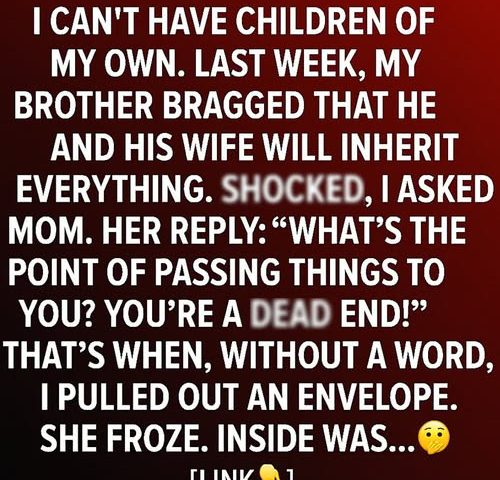I’m unable to have children of my own.
Last week, during a family dinner, my brother leaned back with a smug grin and announced that one day, he and his wife would inherit everything from our parents.
He said it like it was some sort of triumph, as if having kids automatically made him more deserving.
Caught off guard, I turned to my mother and asked quietly, “Is that true?”
Her response cut deeper than I expected. “Why would we leave anything to you? You’re a d.ead end.”
The words hit me like a slap. My chest tightened, and I couldn’t speak.

I’d always known my inability to have children set me apart, but hearing my own mother speak so bluntly—like I no longer mattered—felt like being erased from the family altogether.
I didn’t argue.
Instead, I reached into my bag and pulled out a worn envelope. Silently, I placed it on the table in front of her. My hands trembled, but I held her gaze.
She hesitated, then opened it.
Inside were dozens of handwritten notes—some brightly colored, some covered in stickers, others scrawled in uncertain handwriting—all from the kids I mentor at the community center.
She began to read:
“Thank you for always listening. You make me feel like I matter.”
“Because of you, I believe I can go to college.”
“You’re like family to me.”
Word by word, the room grew still.
Tears welled in her eyes as she kept reading.

My brother fell silent, his smugness replaced with confusion. “These children aren’t mine by blood,” I said softly, “but they are part of my life.
They’re proof that love and legacy aren’t always about who inherits the furniture or the jewelry.
They’re about the lives you touch, the kindness you leave behind, and the impact you carry forward.”
The room grew quiet. For the first time in a long while, my mother looked at me not with pity, but with something closer to pride. She finally whispered, “I didn’t realize. You’ve created a legacy more meaningful than anything I could leave in a will.”
That night, I understood something important. Family isn’t just about who carries your last name—it’s about who carries your love in their heart.
And as I left, I realized I didn’t need to prove my worth through inheritance. My legacy was already alive—in the laughter, the dreams, and the futures of the children who believed in themselves because I believed in them.
